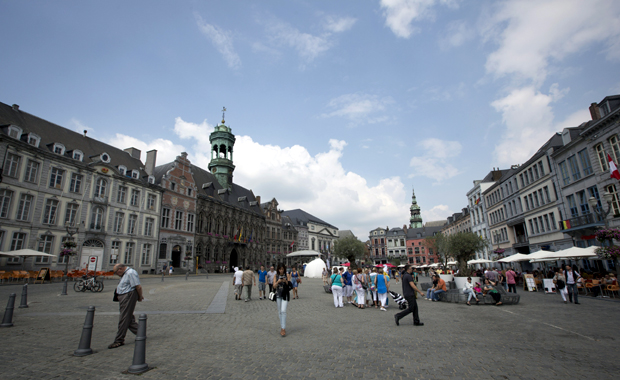World leaders to mark WWI outbreak in Belgium

In this photo taken Saturday, July 26, 2014, the modern city center of Mons, Belgium. Fierce battles around Belgium’s Liege and Mons during World War I held great significance by holding up the pressing Germans for a few days, even if in eventual defeat, delaying their operation and eventually stranding them short of Paris, and short of a swift victory. AP
LIEGE – Government leaders and royalty will gather in the Belgian city of Liege on Monday to mark the 100th anniversary of the outbreak of World War I, a small Balkans conflict that went global with the German invasion of neutral Belgium in August 1914.
Liege, a gritty industrial hub in the east of the country built on coal mining and steel, was the Germans’ first obstacle.
Its short but ferocious resistance remains a source of Belgian pride to this day, causing just enough of a delay to derail Germany’s quick-victory war plans.
Reduced to rubble, Liege paid heavily for its sacrifice, but its bravery was such that France awarded the city the prestigious Legion d’Honneur.
It was the German invasion of Belgium that formally brought Britain into the war, the last link in a chain of interlocking alliances that were meant to preserve the peace but instead plunged Europe into the abyss.
Article continues after this advertisement“The lamps are going out all over Europe. We shall not see them lit again in our time,” lamented British foreign secretary Sir Edward Grey as Berlin rejected London’s ultimatum to respect Belgian neutrality on August 4.
Article continues after this advertisementThe rest is history – 10 million troops dead, 20 million injured, millions of civilian victims, empires toppled, the world remade.
The main ceremony on Monday in Liege is at the Allied War Memorial of Cointe, overlooking the city where a tower complex sits beside a weathered grey-stone church with a massive cupola, streaked green and brown after many years.
– Tight security –
Security is tight with public access limited, so the authorities have put up giant screens in the city center for people to follow the ceremony.
Belgium’s King Philippe will deliver an initial address, followed by French President Francois Hollande, German President Joachim Gauck, Britain’s Prince William and Belgian Prime Minister Elio Di Rupo.
On Sunday, the 100th anniversary of Germany’s declaration of war on France, Hollande and Gauck remembered 30,000 soldiers killed fighting over the rocky peak of Hartmannswillerkopf, in the French border province of Alsace.
Sharing a common theme, they recalled the sacrifices made but also celebrated their countries’ friendship and the reconstruction of Europe after World War II.
“France and Germany, beyond their suffering and bereavements, had the courage to make up — it was the best way to honour the dead and provide a guarantee of peace to the living,” Hollande said.
Such reconciliation was a lesson for all, he added, citing current conflicts in Gaza, Ukraine and beyond.
– First British death –
After Liege, the focus turns late Monday to Mons on the French border, scene of a do-or-die rearguard action by the first British troops committed to the war as London and Paris scrambled to prevent a German breakthrough in late August.
Prince William and Kate, Duchess of Cambridge, along with Prince Harry and Prime Minister David Cameron will lead the tributes in Mons where the first British soldier died.
It was here, too, that the last British soldier was killed on November 11, 1918, the very day of the Armistice that ended hostilities after four bloody years.
The Mons ceremony will focus on the small military cemetery of St Symphorien, where 229 Commonwealth and 284 German soldiers were buried together in a gesture of reconciliation even as the fighting raged.
St Symphorien “is a uniquely fitting place for us to gather in a spirit of common remembrance,” the Commonwealth War Graves Commission said.
“On land donated by a Belgian, in a cemetery first built by the German army and now cared for by the CWGC, the fallen from both sides of the conflict lie together at peace. Today we remember them all.”